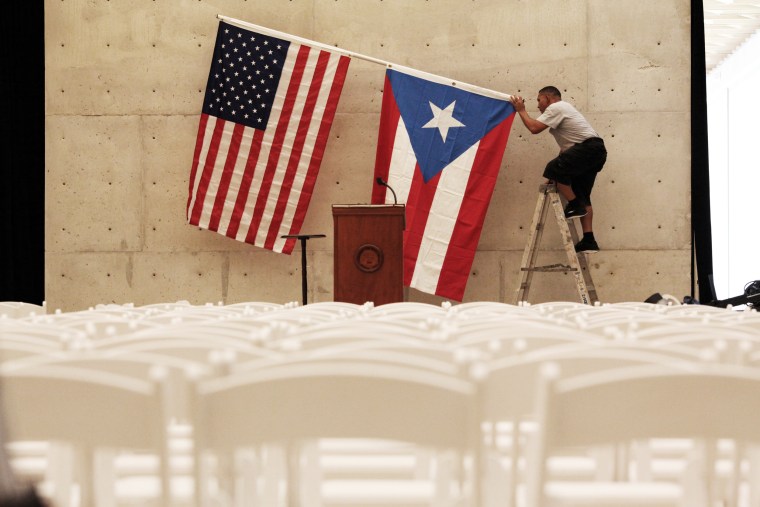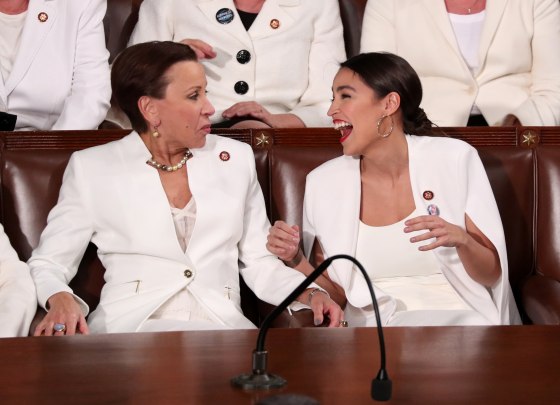A new bill seeking to address the future of Puerto Rico has divided Puerto Rican members of Congress, reflecting a persistent debate over how to approach a vote on the island's status as a U.S. territory.
Several lawmakers in Congress and in Puerto Rico are opposing a new bill introduced Tuesday by two Puerto Rican members of the House, Reps. Alexandria Ocasio-Cortez and Nydia Velázquez, both Democrats of New York.
The Puerto Rico Self-Determination Act of 2020 proposes creating a "status convention" made up of delegates elected by Puerto Rican voters who would come up with a long-term solution for the island’s territorial status — whether that be statehood, independence, a free association or any option other than the current territorial arrangement.
"What the convention negotiates and puts forth would then be voted on in a referendum by the people of Puerto Rico before presentation to the U.S. Congress," Ocasio-Cortez and Velázquez said in an opinion piece for NBC News Think.
"The key is that this framework would be developed by Puerto Ricans and for Puerto Ricans, not dictated to them like so many previous policies," Ocasio-Cortez and Velázquez wrote.
Their new bill has triggered a backlash from Puerto Rican lawmakers who have long supported statehood for Puerto Rico, mainly because Ocasio-Cortez and Velázquez's bill is based on the premise that "there isn’t overwhelming support for statehood in Puerto Rico."
Rep. José Serrano, D-N.Y., blasted Ocasio-Cortez and Velázquez for promoting a "closed doors" effort to determine the island's future.
"I believe that all Puerto Ricans should help determine the future of the island — not just a few. Changing Puerto Rico’s status (a career goal of mine) is too important to be left behind closed doors — all Puerto Ricans should have a say," Serrano said on Twitter.
Ritchie Torres, a New York City Council member who is poised to replace Serrano in the next Congress, praised Serrano's sentiment.
"Wise words from a public servant of incomparable integrity. I am honored to continue your tradition of advocating for true self-determination through direct elections. All Puerto Ricans, not simply party insiders, should have a voice and a vote!" Torres, whose father is Puerto Rican, tweeted.
Last year, Serrano, who has Parkinson's and is not running for re-election, introduced a bill to "enable the admission of Puerto Rico as a State of the Union." The bill has been stuck in the House since its introduction last October.

The last plebiscite in Puerto Ricans on statehood took place in 2017. Though 97 percent of those who voted preferred statehood, opposition parties boycotted the vote, resulting in a record low turnout of 23 percent. In another 2012 plebiscite, 61 percent of voters favored statehood, but that referendum was also mired in controversy over the way the choices for voters were phrased.
Past plebiscites have failed "at determining the true will of the people, and a new approach is sorely needed," Erin Cohan, chief of staff and vice president at the Center for American Progress, a progressive think tank, said in support of Ocasio-Cortez and Velázquez's bill.
"This legislation lays out a fair and inclusive process, with consideration of all nonterritorial and noncolonial options, and a novel approach to working with Congress to find a permanent solution," she said in a statement.
Carlos Vargas-Ramos, director of public policy at the Center for Puerto Rican Studies at Hunter College in New York, previously told NBC News that bills promoting debates around Puerto Rico’s territorial status often serve to motivate the Puerto Rican political base ahead of general elections, especially those who support statehood.
Unnecessary versus fair
Rep. Darren Soto, D-Fla., who is also of Puerto Rican descent, said Ocasio-Cortez and Velázquez's bill is unnecessary because Puerto Ricans are supposed to "have a plebiscite on the Island coming up this November."
"If the people of #PuertoRico choose statehood, then the next steps for Congress are pretty clear. We vote to admit them to the union. In such a scenario, there would be no need for this bill," Soto, who supported Serrano's bill, tweeted.
Puerto Rican Gov. Wanda Vázquez announced in May that she will hold a nonbinding referendum in November to decide whether Puerto Rico should become a state. Unlike previous plebiscites, this referendum will ask one question: Should Puerto Rico be immediately admitted as a U.S. state?
The U.S. Department of Justice recently determined that the plebiscite doesn't comply with the federal government's public policy and declined to fund such effort. But DOJ's blow hasn't discouraged Vázquez and other lawmakers who have advocated for Puerto Rico's statehood from moving forward with the plebiscite.
Rep. Jenniffer González, Puerto Rico's nonvoting member of Congress who is running for re-election under the island's pro-statehood political party, said in a statement that Ocasio-Cortez and Velázquez's "proposal rejects the equality of Puerto Ricans and our desire to become a state."
But Zayira Jordán Conde, one of González's opponents under a newly created political party called Citizen Victory Movement, said that the bill is a step in the right direction, El Nuevo Día, Puerto Rico's national newspaper, reported.
“We need a decolonization process for Puerto Rico that is fair, inclusive, and conclusive," said Jordán Conde in Spanish. "The Assembly is the correct way since the decision would be taken by the Puerto Ricans themselves in negotiation and agreement with the United States government.”
Follow NBC News Latino on Facebook, Twitter and Instagram.


